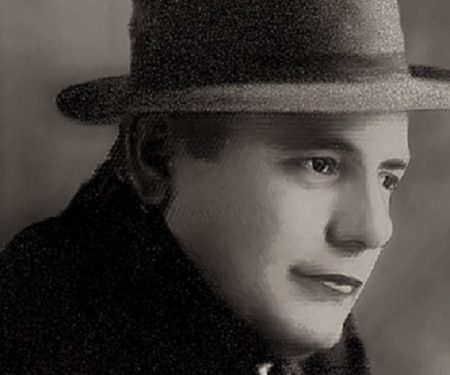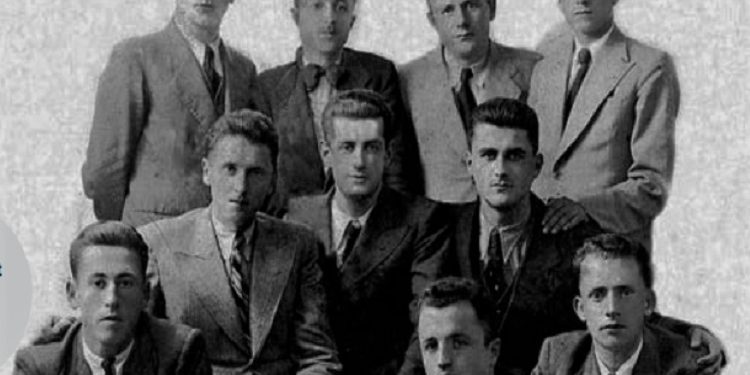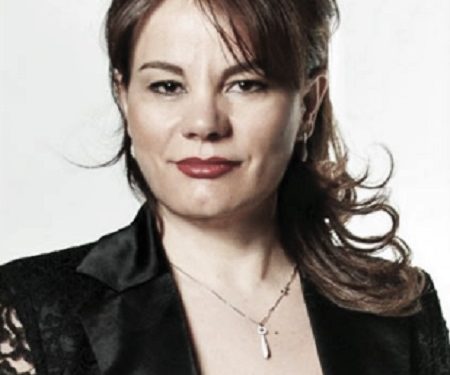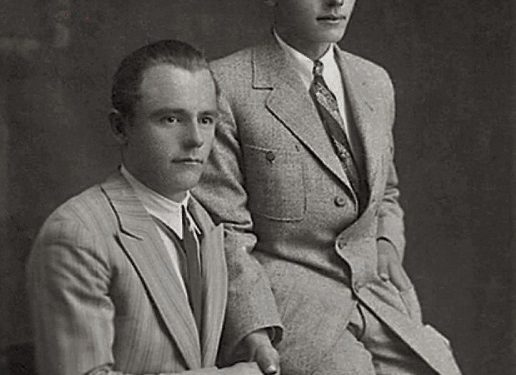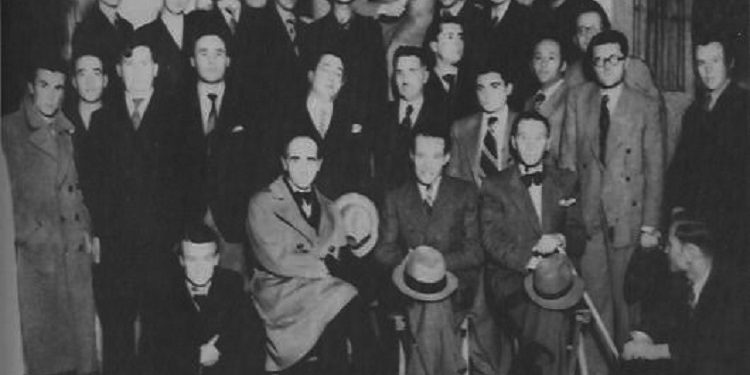Memorie.al / Ermira Xhomaqi, the granddaughter of the former lawyer convicted by the communist regime, Abdulla Rami, has been living in Paris for years, as if to follow the French way of life that her grandfather, after his studies in Montepellier, half left…! Ermira has come here to remember his name, which unlike others, the history of these three 30 years of freedom, has not mentioned much. Maybe that’s why her book, the monograph about her grandfather, came so late! Not that she couldn’t do it herself, growing up with the image of his letters and files of writings, she found it no easier than others to reflect his life in all aspects, but for a while she didn’t think that this his family members should do it. However, today we have in our hands the book “Beyond oblivion”, written by Ermira Xhomaqi, about her grandfather, who in fact already treats him as a historical character, Abdulla Rami.
Mrs. Xhomaqi, did you know the grandfather?
No, unfortunately I was very young when he passed away and I have no vivid memories of him. However, his spirit was always around us. My mother held his letters and manuscripts as sacred, and this image has been firmly imprinted on me since childhood, I was no more than seven years old, when I saw her keeping them in the old chest of the house where we lived, in internment
Many years have passed since then. When did you think to return not only visually to those manuscripts, to summarize them in a book?
The thought must have always been there, but it took shape only three years ago, when I started searching through all the “stations” where Ram had stopped. I hope, this book will be a testimony of bitter truths, but of great proportions. I hesitated quite a bit to write this monograph; in the first place because I thought that someone else and not a family member should undertake such a mission, but the facts, the events, the familiarity with the manuscripts and the extensive documentation in the state and family archives, all this history, I think that it transcends the dimensions of the ordinary and extends to a space that belongs today, to our entire society.
And this increased my obligation to write this work. So, I avoided the first reluctance. I felt that the years were passing and oblivion would no longer forgive any of us, I felt the memories of the past, to disturb the course of my daily life and the events about the loss of family members, to burden me more and more. They were heavy losses, equally heavy pains that shock the sufferer, but also the most unsuffered, and all those honest people who remain behind, would never be able to live in peace again, never!
Even though you haven’t met him, you must be the family member who knows Ram’s life the most. Tell us something about the whole road you traveled…?
He returned to a mission and day after day and month after month gave way to a work that lasted three years. Suddenly, I found myself in the footsteps of a sacrificed youth, I walked day after day in the paths of a murdered life, I collided everywhere with the terror of a wild time, unjustly suffered, and everywhere I found traces of wounds, which still pulsate.
On the way, I met dozens of people: contemporary co-sufferers of Ram, relatives, acquaintances and strangers, who completed this picture for me and pushed me to treat him, beyond family dimensions. I have tried to bring in this writing, the model of a man who became a martyr of freedom and patriotism. To convey his sacrifices, pains and bequests.
They are the ones who call today not to leave us in silence and indifferent, because when we speak and condemn a dictatorship that has consumed people’s lives, time can no longer have its usual notion in the words: “yesterday and today”. We all need such a model, for the figure of this intellectual, still unknown and unappreciated, just as we should and I have to emphasize, despite the fact that it was already pointed out, the fact that; Abdulla Rami belonged to that new Albanian elite, formed in the most beautiful, but also the most tragic period of the 20s-30s of the 20th century, trained at the highest levels of European universities.
Abdullai, it is said that he studied and was a contemporary of important names in history, one of whom, Enver Hoxha, he knew personally?
Yes, they both studied at the French Lyceum; however, he was fellow students with many of the outstanding Albanian intellectual figures in those years such as: Arshi Pipa, Musine Kokalari, Sabiha Kasimati, Myslim Çarçani, Hasan Rami, Abaz Omari, Isuf Luzaj, Lazër Radi, Mit’hat Araniti, Isuf Vrioni, Nedin Kokona, and others, whose dream would sink very quickly in the darkness offered by the dictatorship.
Hence the question: Do we know enough about that heavy drama that the political opponents of the totalitarian regime and their families experienced, immediately after its establishment in Albania? An incomplete answer remains on a hazy and highly confused picture! The echo of this truth requires a wider space to be evaluated and revisited. The messages conveyed in the narratives of these tragedies originate from individual memory, to be conveyed to as many listeners and readers as possible.
How was Rami’s life after returning to Albania and at what point did it change?
The life of Ram, the former lyceum of the French Lyceum of Korça and the student of legal sciences in Montpellier, Enver Hoxha’s classmate, never conforming to his Stalinist goals and practices, would change its trajectory in an extremely chaotic way, and this is the reason why I see every stage related to it today as a deep and obvious paradox. A paradox that is inextricably linked to Ram’s political commitment.
Paradox because, although the figure of a jurist with a clear vision of justice, conceived in francophone audiences, a model of a patriot and nationalist determined in his convictions, a model of a “par excellence” orator, of a politician, open-minded, who tried to lay a stone in the foundations of a modern Albanian state, Abdulla Ram, is deprived of his freedom and the right to practice his profession, he is handcuffed and survives 18 years in the dungeons of the prisons of Tirana, Gjirokastra and Burrel, and then he will spent years in exile.
And regardless of all this, he remained an indomitable and unyielding oppositionist in his ideals and convictions, who never accepted any compromise with the regime in power. Rami’s life was wrapped deeper and deeper in this paradox, because even after leaving Burrell’s hell, he and his family were exiled and expelled, he himself was forced to do heavy manual labor, and yet, he remained defiant to economic difficulties and optimistic about the future.
He remained the talented poet, who conveyed alive the pains from the hell of Gjirokastra Prison and Burrel, became a polyglot and a transmitter of powerful messages in the selection of translations of historical pamphlets by Victor Hugo, Lord Byron, Jean- Marie Guyau, Clarence Dey, Henry Van Dyke, Walter Scott, Emily Jane Brontë, William Johnson Cory, Andre Chénier and others and others.
Abdulla Rami with his two brothers
Under what conditions did Rami go to study in France?
It was September of 1936, when at the age of 28, Abdulla Rami, one of the four sons of Tasim Rami, that patriotic and culture-minded man, after finishing his studies at the French Lyceum of Korça, left for France- Montpelie, like many other fellow students, with the faith and desire to realize his dream of early youth, he graduated in Jurisprudence.
Here in Montpellier, in this old university town, where they had been born and studied; Auguste Comte (Ogyst Comte), philosopher, sociologist and founder of positivism, the poet Paul Valéry (Pol Valeri), or other personalities such as Jean-Jacques Régis de Cambacérès (Kambaseres), the consul of Napoleon III, Aragon, Louise Guiraud, Jean Moulin… who also studied law in Montpellier.
Here, where he lived the years of intense intellectual work, he wrote the first projects full of hope for the future, for his homeland, he was protected by the ideas of Enlightenment and Voltaire, Democracy and Pluralism, Justice and Humanism.
In this city, where, just like in the high school of Korça, the trajectories of his studies would meet with those of the dictator Enver Hoxha, meeting points from which two formations and two different ideological optics would flow, related to their worldview and subsequent activity.
Thus, upon the young lawyer’s return to Albania, his ideas conflicted with the communist ideology, about which, among other things, he would write: “O mysterious birth/ O homeland and spawn of the storm/ that brings only the plague…”!
How did meeting Enver Hoxha affect his life and fate?
The match of Abdulla Rami and many classmates with Hoxha, in the banks of the Korça High School, would cost them dearly, very dearly. Almost all those who had known him closely, friends and associates, and even those who knew him casually, were exiled, imprisoned, tortured, killed and disappeared immediately after he took power.
Enver Hoxha, mentions the Rami brothers several times in his book of memories: “The Years of Youth”, deliberately forgetting all the ordeal of suffering he caused them and other co-lyceum students of Korça Lyceum. Indeed, they were among the few and rare witnesses to the true stories of Hoxha’s youth, which obviously should not come to the surface, but should be hidden by any means and means.
This was, apparently, the reason for which Enver Hoxha asked that none of them remain as witnesses, but also many of the vices of his early youth. Immediately after taking power, Hoxha, clothed with revenge and jealousy, eliminated them physically. First of all, those he considered to be political opponents with an indisputable intellectual potential. Memorie.al




